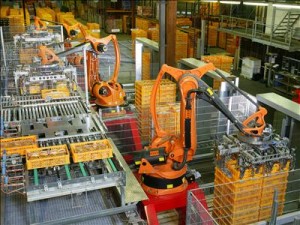
Manufacturing built the United States of America. The rise of the nation is synonymous with the industrial revolution. So why are manufacturers having such a tough time getting American youth interested in working manufacturing, and what is being done to address this problem? Manufacturing Day is an event and a project aimed at fixing this mishap that’s starving companies of would-be workers who are well educated and qualified to power round two of the industrial revolution.
The fact is that US manufacturing is on the rebound. More manufacturing jobs are being created here now that 20 years ago, and many firms who had moved plants overseas are bringing jobs back to the US. Manufacturing Day helps individual companies reach the youth of America while also educating people about the real dynamics of manufacturing today.
Why are American youths so uninterested in manufacturing?
According to Pat Lee, the current director of marketing for the Fabricators and Manufacturer’s Association-a key sponsor and creator of Manufacturing Day, says our culture’s obsession with glamour is part of the problem. The media has come to glorify celebrities and athletes. Those who work in ordinary jobs are indirectly regarded as inferior and manufacturing professions bear the brunt of that stigma.
There is the prevailing misconception that manufacturing jobs are “unskilled labor” and that having such as job makes you less important. The fact is that any manufacturing job is a myriad of multiple tasks. Production technicians are the eyes and ears of the quality control team and liaisons to logistics specialists. Every manufacturing work station these days includes a computer with a live database link, spread sheets and other cyber documents that are the heart of today’s lean manufacturing operation.
The myth that manufacturing is passé
In the early 1990s, manufacturing jobs seemed to be America’s biggest export. The textile industry disappeared, and many other industries shed milli0ns of jobs to overseas plants. The favorite saying that academic intellectuals used to respond to the crisis was that the industrial age was over that we were “in the post-industrial information age”.
There was also the false reassurance that “manufacturing jobs were being replaced by service jobs”-that was just a coincidence that, when considering the fact that most people in the service sector require public assistance just to make ends meet even though they work full-time, we know what a joke that is.

Since we still consume manufactured goods, there is no such thing as the “post-industrial age”; we have merely added a lot of information technology to it, and with manufacturing technicians controlling so much of the collection of information in the manufacturing process, information at formulates corporate financial plans and official data for important financial audits, they are the principle brokers of information.
Lee says it is time to remake the image of manufacturing, and that’s what Manufacturing Day is doing. This year’s Manufacturing Day will kick off in October, and will include at least 240 different events around the nation. Events will be held in all 50 states.
Manufacturing Day is more than just a seminar series. Manufacturing Revival Radio will be following the unfolding events closely. Says MRR’s Todd Schnick, this won’t be a run-of-the mill PowerPoint presentation, “this is a real, hands-on kind of ‘look under the hood and see what’s going on’ [event].”
